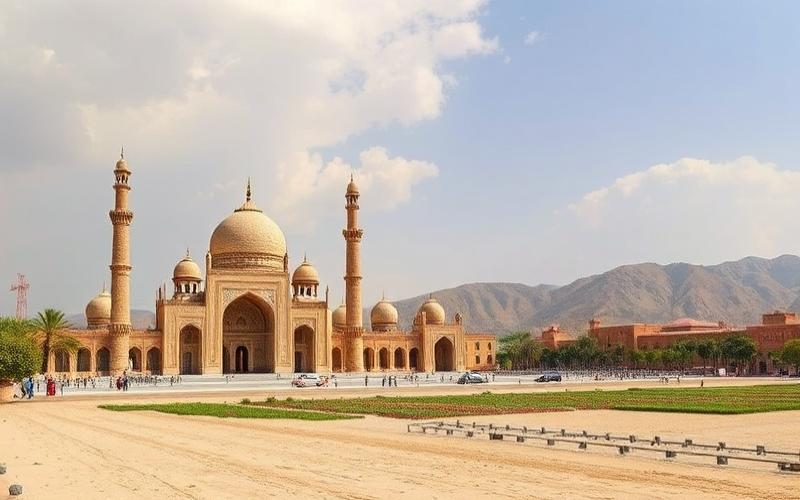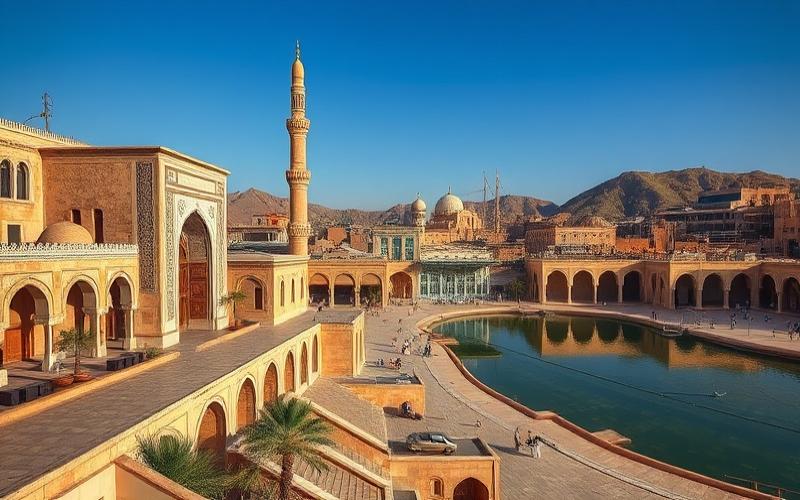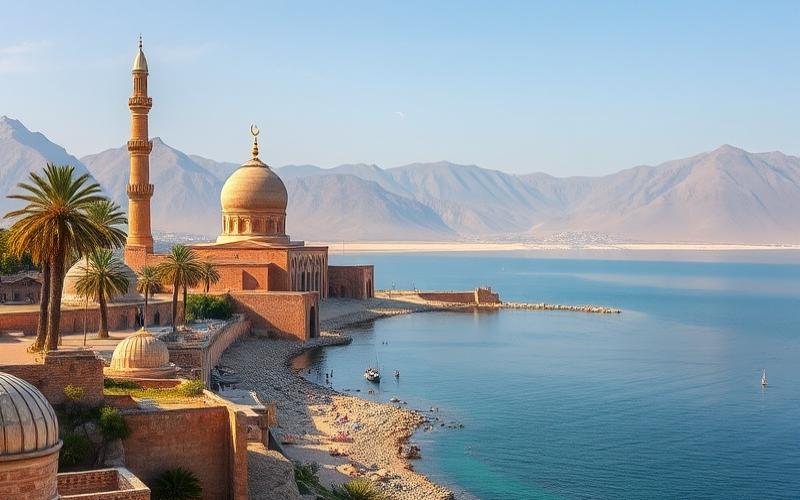
 Published on and written by Cyril Jarnias
Published on and written by Cyril Jarnias
Bahrain, a small island nation in the Persian Gulf, has established itself as a major business and innovation hub in the Middle East. With a growing economy and a business-friendly environment, the kingdom is attracting an increasing number of investors and entrepreneurs from around the world. In this dynamic context, the protection of intellectual property (IP) becomes a crucial issue for companies looking to establish or expand their presence in the country. This article will guide you through the various aspects of IP protection in Bahrain, from the types of existing rights to the most effective protection strategies.
Innovation Gems: Understanding the Different Types of Intellectual Property in Bahrain
In Bahrain, as in many countries, intellectual property is divided into several categories, each benefiting from specific protection. It is essential to understand these different types of IP to choose the most suitable protection for your creations and innovations.
The Bahraini intellectual property system primarily recognizes four types of rights:
1. Patents: They protect new and innovative inventions in all technological fields. In Bahrain, the protection period for a patent is 20 years from the filing date of the application. Inventors can file their applications with the National Patent and Trademark Office.
2. Trademarks: They protect distinctive signs used to identify a company’s products or services. Trademark protection in Bahrain is valid for a period of 10 years, renewable indefinitely. The country recognizes word marks, figurative marks, three-dimensional marks, and sound marks.
3. Copyrights: They protect original literary, artistic, and scientific works. In Bahrain, copyright protection generally extends for the life of the author plus 50 years after their death. This protection covers a wide range of creations, from books to software, including musical and cinematographic works.
4. Industrial Designs: They protect the aesthetic appearance of a product. Protection for industrial designs in Bahrain is granted for an initial period of 10 years, renewable for two additional periods of 5 years each.
It is important to note that Bahrain is a signatory to several international intellectual property treaties, including the Paris Convention for the Protection of Industrial Property and the Agreement on Trade-Related Aspects of Intellectual Property Rights (TRIPS). These agreements ensure extended protection and facilitate procedures for foreign rights holders.
Good to Know:
Bahrain has recently strengthened its intellectual property legislation to comply with international standards and attract more foreign investment. This evolution provides a solid legal framework for the protection of innovations and creations in the kingdom.
From Idea to Protection: Key Steps to Register Your Intellectual Property Rights
Registering your intellectual property rights in Bahrain is a crucial step to ensure their legal protection. Although the process may seem complex, a methodical approach will allow you to effectively secure your intangible assets.
Here are the main steps to follow to register your IP rights in Bahrain:
1. Preliminary Search: Before filing an application, it is essential to check whether similar rights already exist. This search can be conducted with the Bahrain National Patent and Trademark Office or with the help of a specialized lawyer.
2. Application Preparation: Gather all necessary documents, which vary depending on the type of right you wish to register. For a patent, for example, you will need to provide a detailed description of the invention, technical drawings, and claims.
3. Application Filing: Submit your application to the Bahrain National Patent and Trademark Office. Applications can generally be filed in Arabic or English.
4. Application Examination: The office will conduct a formal and substantive examination of your application. This step can take several months, or even years, depending on the type of right and the complexity of the application.
5. Publication and Opposition: Once the examination is completed, the application is published to allow third parties to oppose it if they believe their rights are infringed.
6. Registration: If no opposition is filed or if oppositions are rejected, the right is registered and a certificate is issued.
It is important to note that procedures and timelines may vary depending on the type of IP right. For example, trademark registration is generally faster than patent registration.
Bahrain also offers the possibility to file international applications through the PCT (Patent Cooperation Treaty) system for patents and the Madrid system for trademarks. These options can be particularly interesting for companies seeking protection in multiple countries.
Good to Know:
Bahrain has implemented an online filing system to facilitate IP rights registration procedures. This system saves time and allows you to track the progress of your application more effectively.
Defending Your Rights: Effective Strategies for Managing Intellectual Property Disputes
Despite strong protection, intellectual property disputes can arise. In Bahrain, several options are available to rights holders to defend their interests and resolve conflicts.
Here are the main strategies for effectively managing IP disputes in Bahrain:
1. Legal Actions: Bahraini courts are competent to handle IP infringement cases. The country’s judicial system includes specialized commercial courts, which often handle IP disputes. Legal actions can result in injunctions, damages, and even criminal penalties in the most serious cases.
2. Mediation and Arbitration: Bahrain encourages the use of alternative dispute resolution methods. The Bahrain Center for Dispute Resolution offers mediation and arbitration services that can be faster and less costly than traditional court proceedings.
3. Customs Actions: Rights holders can register their trademarks with Bahraini customs authorities. This allows customs to seize counterfeit goods at the border, providing proactive protection against illegal imports.
4. Direct Negotiations: In many cases, an amicable approach can be the most effective solution. Direct negotiations with the opposing party can lead to licensing or coexistence agreements, avoiding lengthy and costly procedures.
5. Market Surveillance: Active market monitoring can help quickly detect infringements of your rights. Online and offline surveillance services are available to help rights holders identify counterfeits and unauthorized uses.
It is crucial to react quickly in case of infringement of your IP rights. Bahraini law provides for statutes of limitations for infringement actions, generally three years from the date the rights holder became aware of the infringement.
Good to Know:
Bahrain has strengthened its anti-counterfeiting laws in recent years, with harsher penalties for offenders. This evolution demonstrates the country’s commitment to protecting IP rights and creating an environment favorable to innovation.
Expertise at the Service of Your Rights: The Importance of Specialized Legal Advice
In the complex field of intellectual property, seeking specialized legal advice can make all the difference in protecting and valuing your intangible assets in Bahrain. IP lawyers and advisors play a crucial role at every stage of the process, from initial registration to dispute management.
Here is why and how to benefit from expert legal advice on IP in Bahrain:
1. Local and International Expertise: IP-specialized lawyers in Bahrain are familiar not only with local laws but also with applicable international treaties. This dual expertise is valuable for navigating the Bahraini legal system while considering global issues.
2. Tailored Protection Strategy: An IP advisor can help you develop a protection strategy tailored to your specific needs. They can guide you on the most appropriate types of protection for your innovations and help you prioritize your steps based on your business objectives.
3. Management of Registration Procedures: Specialized lawyers can manage the entire process of registering your IP rights, from preparing documents to responding to any objections from the patent and trademark office.
4. Negotiations and Contracts: For licensing agreements, technology transfers, or partnerships involving IP rights, a lawyer can help you negotiate favorable terms and draft solid contracts that protect your interests.
5. Representation in Case of Dispute: In case of conflict, an IP-specialized lawyer can represent you in court or in mediation and arbitration proceedings, maximizing your chances of success.
6. Legal Monitoring: IP laws and regulations are constantly evolving. A legal advisor can keep you informed of relevant changes and help you adapt your strategy accordingly.
To find a lawyer or IP advisor in Bahrain, you can contact the Bahrain Lawyers Association or international law firms with a local presence. It is recommended to choose a professional with specific experience in your field of activity and the type of IP you are seeking to protect.
Good to Know:
Some law firms in Bahrain offer free initial consultations to assess your IP needs. This is an excellent opportunity to obtain an initial expert opinion without commitment.
Anticipate to Better Protect: Proactive Strategies to Secure Your Intellectual Property
Protecting intellectual property is not limited to registering rights. A proactive and strategic approach is essential to maximize the value of your intangible assets and prevent violations. Here are key strategies to strengthen the protection of your IP in Bahrain:
1. Regular IP Audits: Conduct periodic audits of your IP portfolio to identify unprotected assets, assess the relevance of existing protections, and align your IP strategy with your business objectives.
2. Employee Training: Raise awareness among your employees about the importance of IP and implement clear policies on the management of confidential information and innovations within the company.
3. Confidentiality Agreements: Systematically use non-disclosure agreements (NDAs) during discussions with potential partners, suppliers, or clients involving sensitive information.
4. Early Filing Strategy: For patentable innovations, consider filing provisional or priority applications to establish a priority date as early as possible.
5. International Protection: If you plan to expand beyond Bahrain, plan an international protection strategy using the PCT system for patents and Madrid for trademarks.
6. Competitive Monitoring: Regularly monitor your competitors’ IP activities to detect potential infringements of your rights or identify cross-licensing opportunities.
7. Trade Secret Management: Implement strict procedures to protect your trade secrets, including physical and digital access controls.
8. IP Valuation: Explore opportunities to monetize your IP through licensing, franchising, or strategic partnerships.
9. Rigorous Documentation: Maintain detailed documentation of your creation and innovation processes. This can be crucial in case of dispute to prove the origin and date of your inventions.
10. Adaptation to New Technologies: Stay informed about technological developments that could affect your IP, such as blockchain for copyright management or artificial intelligence in the innovation process.
By implementing these strategies, you create a robust ecosystem around your intellectual property, reducing the risks of infringement and maximizing the value of your innovations in the Bahraini market and beyond.
Good to Know:
Bahrain has recently launched initiatives to promote innovation and IP protection, including tax incentives for companies investing in R&D. Inquire about these programs to optimize your IP strategy.
Protecting intellectual property in Bahrain is a complex but essential process for any innovative company. By understanding the different types of rights available, rigorously following registration procedures, adopting a proactive approach in managing disputes, and relying on expert legal advice, you can create a strong shield around your innovations.
Bahrain, with its growing commitment to IP protection and its dynamic business environment, offers fertile ground for companies that know how to value and protect their intangible assets. By implementing the strategies described in this article, you will be well positioned to fully leverage the opportunities offered by this expanding market, while securing your valuable innovations.
Disclaimer: The information provided on this website is for informational purposes only and does not constitute financial, legal, or professional advice. We encourage you to consult qualified experts before making any investment, real estate, or expatriation decisions. Although we strive to maintain up-to-date and accurate information, we do not guarantee the completeness, accuracy, or timeliness of the proposed content. As investment and expatriation involve risks, we disclaim any liability for potential losses or damages arising from the use of this site. Your use of this site confirms your acceptance of these terms and your understanding of the associated risks.

















